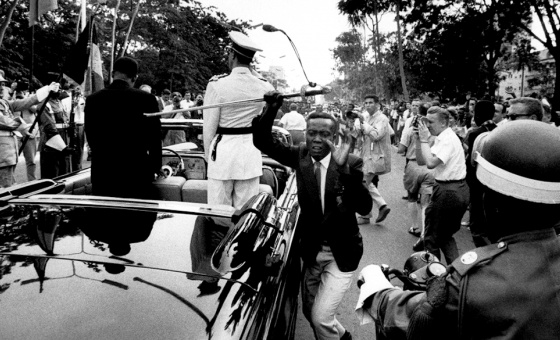This is the last article you can read this month
You can read more article this month
You can read more articles this month
Sorry your limit is up for this month
Reset on:
Please help support the Morning Star by subscribing here
TWELVE months ago Europe’s left sighed with relief after Alexander Van der Bellen, a Green, saw off the far-right Freedom Party’s (FPO’s) Norbert Hofer to become president of Austria.
The respite has been short-lived, with Mr Van der Bellen approving at the weekend a coalition deal that brings the fascists into government in Vienna after all.
A media that has been at pains to downplay the resurgence of far-right politics across Europe likes to avoid the word fascist. It tends to term the FPO “right-wing populist” or even “pro-Putin.”
Neither of these descriptors are untrue.
Like most far-right groups, the FPO affects a populist anti-Establishment stance, one belied by its pro-privatisation and tax cuts economic policies and its willingness to go into coalition with the conservative People’s Party.
And like a number of far-right outfits across Europe — from Marine Le Pen’s Front National to Italy’s Forza Nuovo and even Britain’s BNP — the FPO has also expressed admiration for Russia’s government, appreciating its nationalist rhetoric and hostility to gay rights.
But these are hardly adequate terms for a party founded by an ex-nazi who was an officer in the SS during the second world war.
Its hostility to immigrants is extreme, and it doesn’t take a mathematical genius to work out that when its leader Heinz-Christian Strache — now vice-chancellor of the Austrian government — called earlier this year for “zero and minus immigration,” he meant deportations and the expulsion of people of foreign origin.
The FPO has said — again this year — that “fascistic Islam” must be banned, claims “Islamification” is a terminal threat to the Austrian way of life and wants to outlaw “Muslim symbols.”
In the deal it has struck with the People’s Party, it takes control of Austria’s defence, interior and foreign ministries.
Surely Europe should be up in arms about this power-grab by a gang of xenophobic racists?
Not a bit of it. The march of the radical right across Europe is not confined to Austria.
Le Pen, who saluted the FPO’s new status as “excellent news for Europe” on Saturday, came second in the French elections, after all — and the man hailed as the saviour of liberal Europe for beating both her and the left seeks to rule by decree rather than through parliament and has legislated for a permanent state of emergency granting extraordinary powers to the police.
The FPO’s momentum is mirrored by that of the AfD in Germany, the Italian far-right are increasingly breaking into asylum centres and even attacking newspaper offices, xenophobic governments in Warsaw and Budapest are stamping on the opposition and Ukraine has become a playground for openly neonazi paramilitary groups.
Brussels is happy to wink at the rising tide of filth — European Council president Donald Tusk is already pushing for even harsher treatment of refugees fleeing war and genocide in the Middle East — so long as the fascists are on board with Permanent Structured Co-operation (Pesco), the “European Defence Union” hailed by Jean-Claude Juncker as a stepping stone to the joint EU military to “fight the resource wars of the 21st century” once dreamed of by Jacques Delors.
Austria’s enthusiastic support for Pesco will end the country’s official neutrality — as it will for Ireland — further embedding both countries into the aggressive Washington-led Nato alliance.
It is no coincidence that Britain, where Labour’s appeal has been revolutionised by Jeremy Corbyn, has the weakest far right in Europe, or that a recent Financial Times poll of attitudes in Austria, France, Italy, Germany and the UK found the lowest (while still worryingly high) levels of Islamophobia here.
There is no defence from the far right in Establishment institutions. This is a battle for the left.








